- Create new account
- Reset your password
Register and get FREE resources and activities
Ready to unlock all our resources?
- William Shakespeare
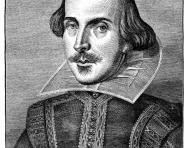

Who was William Shakespeare?
William Shakespeare is a famous British playwright , which means he’s someone who wrote plays. Shakespeare is considered to be one of the most talented writers of all time.
Shakespeare lived around the late 16th century and early 17th century, and in between the reigns of Queen Elizabeth I and King James I. Both of them saw some of the plays he wrote, which are still performed today. Some of the phrases that Shakespeare wrote have even become part of our everyday language!
Top 10 facts
- William Shakespeare was born in Stratford-upon-Avon in April 1564.
- Shakespeare’s wife’s name was Anne Hathaway.
- Shakespeare had three children: Susanna, Hamnet and Judith.
- Shakespeare worked as actor with the Lord Chamberlain’s Men, later called the King’s Men.
- Shakespeare wrote 154 sonnets and around 40 plays.
- One of Shakespeare’s first plays was Henry V .
- Shakespeare’s plays were performed for both Queen Elizabeth I and King James I – James I was the patron of Shakespeare’s theatre group.
- Shakespeare’s theatre group performed in the Globe Theatre and the Blackfriars Theatre.
- Some phrases that Shakespeare wrote in his plays are things we still say today.
- 1564 William Shakespeare was born in Stratford-upon-Avon
- 26 April 1564 Shakespeare was baptised
- November 1582 Shakespeare married Anne Hathaway
- 1592 This is the earliest time when records show that Shakespeare was in London
- 1593 Shakespeare’s first poem was published, and his plays started to be performed by different theatre groups in London

- 1603 James I was crowned king, and Shakespeare’s theatre group was renamed the King’s Men when the King became their patron
- 1604-1605 The King’s Men performed seven of Shakespeare’s plays for King James I
- 1609 Shakespeare’s sonnets were published

- 23 April 1616 William Shakespeare died
- 1623 The first collection of Shakespeare's work was published, called The First Folio
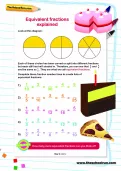
Boost Your Child's Learning Today!
- We'll created a tailored plan for your child...
- ...and add English & maths activities to it each week...
- ...so you can watch your child grow in skills & confidence
Did you know?
- We don’t know the date that William Shakespeare was born – we just know the date that he was baptised.
- Shakespeare had three children named Susanna, Hamnet and Judith. Hamnet and Judith were twins.
- Before Shakespeare wrote plays, he worked as an actor with the Lord Chamberlain’s Men.
- The Lord Chamberlain’s Men changed its name to the King’s Men in 1603, which is when James I was crowned king and became the group’s patron.
- Shakespeare wrote both poems and plays – he started out by writing poems first.
- Most of the poems Shakespeare wrote are called sonnets . He wrote 154 sonnets!
- Shakespeare is sometimes called ‘The Bard of Avon’ – a bard is another word for a poet.
- Shakespeare wrote almost 40 plays; someone who writes plays is also called a playwright.
- Not a lot of people could read and write in Shakespeare’s time, so the Globe Theatre hung different coloured flags to let people know when a play was going to be performed, and what kind of play it was going to be (if it was sad or funny).
- The Globe Theatre was shaped like an octagon – it had eight sides.
- Women didn’t act in Shakespeare’s time, so boys would have to play the roles of women. That means that Juliet in Romeo and Juliet would have been played by a boy!
Look through the gallery and see if you can spot all the following:
- Anne Hathaway's Cottage
- A statue of Shakespeare
- Mary Arden was Shakespeare's mother; visitors can still see her childhood home today
- William Shakespeare’s birthplace
- William Shakespeare’s grave (Photo Credit: Elliott Brown)
- A drawing of what Shakespeare’s Globe Theatre would have looked like
- A replica (copy) of Shakespeare’s Globe Theatre, which was built in London in 1997
- The stage in the Globe
- The Royal Shakespeare Theatre in Stratford
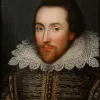
Even though they lived in Stratford-upon-Avon, William Shakespeare and Anne Hathaway were married in a village called Temple Grafton. At some point between 1585 and 1592, Shakespeare moved to London . His wife and children were still in Stratford-upon-Avon, and Shakespeare didn’t move back there until 1611. Shakespeare mostly wrote plays and sonnets, which are a kind of poem. Sonnets have 14 lines with 10 syllables in each line. Shakespeare’s theatre group, The King’s Men, worked in two theatres, the Globe and the Blackfriars. The Globe Theatre didn’t have a roof on it, but the Blackfriars Theatre did so it could be used when the weather got cold. Seeing a play at the Globe Theatre was comfortable if you could pay for a seat with a cushion, but if you paid just one penny you could stand in the middle. Actors in Shakespeare’s time had a bad reputation – people thought they weren’t very nice people, and couldn’t be trusted. So, groups of actors – called troupes – tried to get someone rich to sponsor them. This sponsor would give them money and things that they needed. Shakespeare’s theatre group would have had to show people a piece of paper with their sponsor’s name written on it if they wanted to be welcomed somewhere. Shakespeare was part of The Friday Club , a group for actors, poets, authors and playwrights (like Shakespeare). The explorer Sir Walter Raleigh began the group in 1603, and they all met in the Mermaid Tavern, so they sometimes called themselves the Mermaid Club. Shakespeare wrote three different kinds of plays – comedies (funny plays), tragedies (sad plays) and histories (plays about a real person). A different colour flag would be flown from the top of the theatre so people would know which play was about to be performed – white meant a comedy would be performed, red a history, and black or dark colours meant a tragedy. Shakespeare’s comedy plays are: All's Well That Ends Well, As You Like It, The Comedy of Errors, Cymbeline, Love's Labour's Lost, Measure for Measure, The Merchant of Venice, The Merry Wives of Windsor, A Midsummer Night’s Dream, Much Ado About Nothing, Pericles, Prince of Tyre, Taming of the Shrew, The Tempest, Troilus and Cressida, Twelfth Night, Two Gentlemen of Verona and A Winter's Tale. Shakespeare’s tragedy plays are: Antony and Cleopatra, Coriolanus, Hamlet, Julius Caesar, King Lear, Macbeth, Othello, Romeo and Juliet, Timon of Athens and Titus Andronicus. Shakespeare’s history plays are: King Henry IV Part 1, King Henry IV Part 2, King Henry V, King Henry VI Part 1, King Henry VI Part 2, King Henry VI Part 3, King Henry VIII, King John, Richard II and Richard III. Shakespeare wrote his sonnets and plays around 400 years ago, but some of the phrases he wrote have become a part of our everyday language. For instance, you might have heard someone in trouble say that they’re ‘in a pickle’, or heard being jealous described as ‘the green-eyed monster’.
Famous friends:
Sir Walter Raleigh (c.1552 – 1618) – Sir Walter Raleigh visited America and helped start colonies there, and some people think that he was the first one to bring tobacco and potatoes into England. He also founded the Friday Club in 1603, which was a group for poets and playwrights that Shakespeare belonged to. Ben Johnson (1572-1637) – Ben Johnson wrote plays and poems around the same time that Shakespeare did. Both he and Shakespeare belonged to the Friday Club that Sir Walter Raleigh began. Ben wrote a poem in the introduction of Shakespeare’s First Folio, which is the collection of works that was published a few years after Shakespeare died. Henry Wriothesley, Earl of Southampton (1573-1624) – Henry Wriothesley was a wealthy man, and the patron of William Shakespeare. He loved the theatre and plays. Richard Burbage (1568-1619) – Richard Burbage was a famous actor, and part of William Shakespeare’s theatre group. He often played the lead role in Shakespeare’s plays. Christopher Marlowe (1564-1593) – Christopher Marlowe was born the same year as Shakespeare, and also famous for writing plays. Shakespeare didn’t start writing plays and having them performed until after Christopher Marlowe died.
Related Videos
Just for fun...
- Find Shakespeare wordsearches, comic strips, puppet-making, worksheets and more on the Shakespeare Week website
- Watch Horrible Histories Shakespeare songs: List of Plays 'wot I've Written and Shakespeare and the Quills Song
- Go Totally Shakespeare with CBBC! Complete quizzes, watch funny clips and find the best Shakespeare facts
- Download some Shakespeare-themed colouring-in
- Try a few of our suggestions to introduce children to Shakespeare's work
- Watch a free animated adaptation of The Tempest and A Midsummer Night's Dream on BBC Teach
- Find out how to 'rap' Shakespeare
- In Shakespeare Retold , 10 of Shakespeare’s most famous plays are the inspiration for a new stories by leading children’s writers; listen to them online
- Playing for Shakespeare is an free interactive game for desktop computers from the Shakespeare Birthplace Trust
- Take the Shakespeare or Fakespeare quiz
- Unscramble some Shakespeare word jumbles
- Which Shakespeare character are you? Take a quiz to find out!
Children's books about Shakespeare
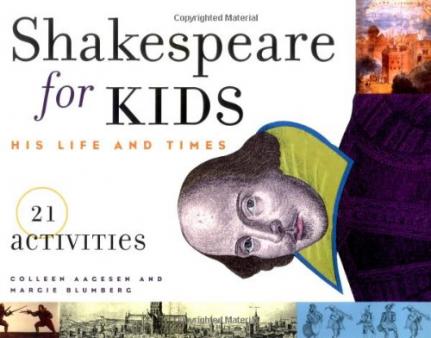
Shakespeare stories rewritten for children
Shakespeare's famous stories have been reworded and illustrated for different ages and offer a great introduction to his classic plays. We love these five series, or look through our Best Shakespeare stories for children guide :
- Short, Sharp Shakespeare Stories
- Shakespeare Children's Stories
- Shakespeare Stories from Orchard Books
- Usborne: Shakespeare's plays retold for children
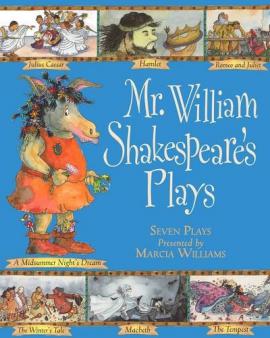
Find out more:
- Watch a BBC Bitesize KS1 animation about William Shakespeare
- The Royal Shakespeare Company's Shakespeare Learning Zone offers loads of information on Shakespeare's plays, including key facts, key scenes, pictures from past productions and videos of actors and directors working on and performing the plays
- Download a visual timeline of the major events in Shakespeare’s life and Elizabethan England
- Find out why Shakespeare is famous in a CBBC Newsround guide
- A children's introduction to Shakespeare from DKfindout!
- Join historian Greg Jenner for a BBC Sounds kids' homeschool history lesson about William Shakespeare
- Discover Shakespeare's life and work through numbers
- Watch clips and play games on CBBC's Shakespeare page
- Find out about the world that Shakespeare lived in with fact pages about playhouses, writing plays and more
- 15 top Shakespeare facts from National Geographic Kids
- Look at primary sources about Shakespeare , including his will and information about his taxes
- See an animated "life of Shakespeare" video for children
- Look through some of the Shakespeare portraits in the National Portrait Gallery
See for yourself
- Visit Shakespeare’s birthplace in Stratford-upon-Avon to find out more about his life
- At Shakespeare's Schoolroom & Guildhall you can explore classroom where Shakespeare studied between the ages of 7 and 14, find out about the kind of lessons he went to and even try some Tudor homework!
- While you’re in Stratford-upon-Avon , see where Shakespeare is buried at the Holy Trinity Church
- A replica of the Globe Theatre was built in London near the spot where Shakespeare’s theatre stood. You can visit in person or take a virtual tour if you can't get there in person!
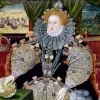
Give your child a headstart
- FREE articles & expert information
- FREE resources & activities
- FREE homework help
Pardon Our Interruption
As you were browsing something about your browser made us think you were a bot. There are a few reasons this might happen:
- You've disabled JavaScript in your web browser.
- You're a power user moving through this website with super-human speed.
- You've disabled cookies in your web browser.
- A third-party browser plugin, such as Ghostery or NoScript, is preventing JavaScript from running. Additional information is available in this support article .
To regain access, please make sure that cookies and JavaScript are enabled before reloading the page.
my S hakespeare
Sign in with:, or use e-mail:.
- Romeo and Juliet
- Julius Caesar
- The Taming of the Shrew
- A Midsummer Night's Dream
.png)
T eacher T estimonials
This is an excellent resource for any teacher's Hamlet curriculum. My students enjoyed a different take on a classic Shakespearean play. I highly recommend it for any high school English class studying Hamlet .
I have tried many film versions of Macbeth to help my students understand the Bard, but this is a great supplement to their studies. It explores not only the language, but the motives and emotions of the characters, and does it in a satirical, talk-show format, with "commercials" and songs. The students really get it!
As an English teacher for 15 years, I have never found a resource that effectively grabs the students’ attention like this one. I was able to do my Macbeth unit in two weeks, and they learned more than if I had taught it in six weeks. It was awesome!
Your site is gorgeous. I am teaching Hamlet to 5th- and 6th-graders, which is a tall task, and your layout gives all kinds of possibilities for explaining lines and passages from the play. Students love playing around with the videos. Just beautiful work. Thank you.
B etter Shakespeare pedagogy is here.
Delve into our blog for illuminating articles on teaching Shakespeare. We cover history, instructional tips, news, and contemporary relevance, tailored to enrich your teaching.
Explore the Blog

- For Teachers
- Privacy Policy
- Terms of Service

- Fundamentals NEW
- Biographies
- Compare Countries
- World Atlas
William Shakespeare at a glance
Related resources for this article.
- Primary Sources & E-Books
Introduction
Few authors can match William Shakespeare for broad appeal and sheer endurance. For more than four centuries he has entertained readers and theatergoers, helping us see our commonalities and revealing our humanness. Shakespeare’s tender scenes of reconciliation, such as that between Lear and Cordelia, continue to break hearts in the 21st century. The themes of his love stories, such as Romeo and Juliet , are as fresh and universal today as they must have been when he wrote them. Words Shakespeare invented are now an essential part of the English vocabulary. His works have been translated worldwide. So why does Shakespeare stand out so far among his contemporaries? What makes his speech so compelling? Where did he obtain his depth of understanding, his wit? Who was he exactly?
We invite you to explore Shakespeare with the following collection of links to articles about the playwright, his works, and his world. The links are arranged in five sections:
- The Bard —featuring a biography of Shakespeare and articles about people and places associated with him, a selection of the sources he used in writing the plays, and purported authors (men who some people have claimed actually wrote the plays)
- The Plays — alphabetical and chronological lists of all of Shakespeare’s plays
- The Elizabethan World —with articles about Renaissance England and writers and actors of the age
- Since Shakespeare’s Time —with biographies of actors, directors, and scholars known for their work with Shakespeare’s plays in the years after his death
- Video —a selection of videos about Shakespeare’s works and world, including excerpts from his plays
For additional information, see also teaching Shakespeare ; acting ; drama ; English literature ; poetry ; theater .
- William Shakespeare , a biography of the playwright, poet, and actor
People and Places
- Stratford-upon-Avon , his birthplace
- Anne Hathaway , his wife
- Globe Theatre , his professional home
- Blackfriars Theatre , the winter quarters of his theatrical company
- Lord Chamberlain’s Men , his theatrical company
- Richard Burbage , the company’s leading actor, excelling in tragedy
- Robert Armin , a comic actor in the company
- William Kempe , a comic actor in the company
- Henry Condell , an actor in the company and editor of the First Folio
- John Heminge , an actor in the company and editor of the First Folio
Sources and Influences
With a few exceptions, Shakespeare did not invent the plots of his plays. He drew on a great variety of sources for story lines and other material for his works. The following is a selection of some of Shakespeare’s many sources and literary influences.
- Matteo Bandello
- Giovanni Boccaccio
- commedia dell’arte
- Raphael Holinshed
- Thomas Lodge
- Christopher Marlowe
- Michel de Montaigne
- Thomas North
- Philip Sidney
Purported Authors
Since the late 18th century, some people have questioned whether the William Shakespeare of modest background from Stratford-upon-Avon actually wrote the plays. Various candidates have been proposed as the “real” author, including those in the following list. These claims have been rejected by the majority of Shakespeare scholars. ( See also Shakespeare, William, “Did Shakespeare Really Write the Plays?” .)
- Francis Bacon
- Edward de Vere, 17th earl of Oxford
Return to top of page ; The Bard ; The Plays ; The Elizabethan World ; Since Shakespeare’s Time ; Video .
Shakespeare wrote at least 38 plays. The alphabetical and chronological lists below provide links to articles about each of his plays. For information about the first collected edition of Shakespeare’s plays, see First Folio .
Alphabetical List of the Plays
- All’s Well That Ends Well (comedy)
- Antony and Cleopatra (tragedy)
- As You Like It (comedy)
- Cardenio (now lost; presumed basis for Double Falsehood )
- The Comedy of Errors (comedy)
- Coriolanus (tragedy)
- Cymbeline (romance)
- Hamlet (tragedy)
- Henry IV, Part 1 (history)
- Henry IV, Part 2 (history)
- Henry V (history)
- Henry VI, Part 1 (history)
- Henry VI, Part 2 (history)
- Henry VI, Part 3 (history)
- Henry VIII (history; probably in collaboration with John Fletcher )
- Julius Caesar (tragedy)
- King John (history)
- King Lear (tragedy)
- Love’s Labour’s Lost (comedy)
- Macbeth (tragedy)
- Measure for Measure (comedy)
- The Merchant of Venice (comedy)
- The Merry Wives of Windsor (comedy)
- A Midsummer Night’s Dream (comedy)
- Much Ado About Nothing (comedy)
- Othello (tragedy)
- Pericles (romance)
- Richard II (history)
- Richard III (history)
- Romeo and Juliet (tragedy)
- The Taming of the Shrew (comedy)
- The Tempest (romance)
- Timon of Athens (tragedy)
- Titus Andronicus (tragedy)
- Troilus and Cressida (“problem play”)
- Twelfth Night (comedy)
- The Two Gentlemen of Verona (comedy)
- The Two Noble Kinsmen (romance; in collaboration with John Fletcher )
- The Winter’s Tale (romance)
Chronological List of the Plays
The elizabethan world.
- Elizabeth I
- England, “Elizabeth I and England’s Golden Age”
- Renaissance
- William Byrd
- Thomas Campion
- Francis Drake
- Gunpowder Plot
- Inigo Jones
- Thomas Morley
- Walter Raleigh
- Spanish Armada
- Thomas Weelkes
Elizabethan Playwrights and Poets
- Francis Beaumont
- George Chapman
- Thomas Dekker
- John Fletcher
- Robert Greene
- Thomas Heywood
- Thomas Middleton
- John Milton
- George Peele
- James Shirley
- Edmund Spenser
Elizabethan Theater
- drama, “The Renaissance”
- theater, “Shakespeare and the Elizabethan Theater”
- Robert Armin
- Blackfriars Theatre
- Richard Burbage
- Henry Condell
- Globe Theatre
- John Heminge
- Philip Henslowe
- William Kempe
- Lord Chamberlain’s Men
- University Wits
Since Shakespeare’s Time
The following list features actors, directors, scholars, editors, and others associated in some manner with Shakespeare in the centuries since Shakespeare himself trod the boards.
- Maude Adams
- Ira Frederick Aldridge
- Peggy Ashcroft
- John Barrymore
- Sarah Bernhardt
- Claire Bloom
- Edwin Booth
- Junius Brutus Booth
- Kenneth Branagh
- Peter Brook
- Richard Burton
- Colley Cibber
- Samuel Taylor Coleridge
- Charles Cowden Clarke and Mary Cowden Clarke
- Edward Davenport
- Thomas De Quincey
- Ignatius Donnelly
- Edward Dowden
- Maurice Evans
- Ralph Fiennes
- Henry Clay Folger
- Johnston Forbes-Robertson
- Edwin Forrest
- David Garrick
- John Gielgud
- Alec Guinness
- Tyrone Guthrie
- Henry Irving
- Derek Jacobi
- James Earl Jones
- Charles Kean
- Edmund Kean
- Fanny Kemble
- Kurosawa Akira
- Charles Lamb
- Charles Laughton
- Vivien Leigh
- William Charles Macready
- Julia Marlowe
- Ian McKellen
- Helen Mirren
- Helena Modjeska
- Laurence Olivier
- Peter O’Toole
- Joseph Papp
- Christopher Plummer
- Anthony Quayle
- Michael Redgrave
- Ralph Richardson
- Paul Robeson
- Nicholas Rowe
- Paul Scofield
- Sarah Siddons
- Otis Skinner
- Edward Hugh Sothern
- Elizabeth Taylor
- Ellen Terry
- Lewis Theobald
- Herbert Beerbohm Tree
- James William Wallack
- Orson Welles
- Peg Woffington
- Franco Zeffirelli
Shakespeare’s contributions to the English language
Historical overview of london in 1500–1700, performing shakespeare, the globe theatre, the globe theatre and modern replica, original pronunciation of shakespeare’s english, publishing shakespeare, the first folio, droeshout portrait of shakespeare, nicholas rowe’s edition, early modern printing press, textual scholarship, the comedy of errors, plot overview, transformation of the character hamlet, use of soliloquy, ophelia’s madness, “o, that this too too sullied flesh would melt”, “now i am alone. oh, what a rogue and peasant slave am i”, “get thee to a nunnery”, hamlet considers killing claudius, hamlet confronts gertrude, hamlet mistakenly kills polonius, julius caesar, “let me have men about me that are fat”, “what can be avoided whose end is purposed by the mighty gods”, “horror thriller” elements, the weird sisters (three witches), lady macbeth goads macbeth to murder duncan, macbeth is haunted by his crime, deception in othello, language in othello, romeo and juliet, the tempest, it’s here: the new britannica kids website.
We’ve been busy, working hard to bring you new features and an updated design. We hope you and your family enjoy the NEW Britannica Kids. Take a minute to check out all the enhancements!
- The same safe and trusted content for explorers of all ages.
- Accessible across all of today's devices: phones, tablets, and desktops.
- Improved homework resources designed to support a variety of curriculum subjects and standards.
- A new, third level of content, designed specially to meet the advanced needs of the sophisticated scholar.
- And so much more!
Want to see it in action?
Start a free trial
To share with more than one person, separate addresses with a comma
Choose a language from the menu above to view a computer-translated version of this page. Please note: Text within images is not translated, some features may not work properly after translation, and the translation may not accurately convey the intended meaning. Britannica does not review the converted text.
After translating an article, all tools except font up/font down will be disabled. To re-enable the tools or to convert back to English, click "view original" on the Google Translate toolbar.
- Privacy Notice
- Terms of Use
Shakespeare's Globe

TEACHING RESOURCES.
Explore our range of engaging teaching resources for all ages and levels
- Teaching resources
- Teacher training
- Playing Shakespeare with Deutsche Bank
- Online events
- Globe On Screen
- Globe 360° iOS app
- Mailing list
Whether you’re teaching remotely, working from home with your children, or teaching in school, you’ll find a range of inspiring resources from Shakespeare’s Globe.
Options to support you include:
- Resources from previous productions
- Resources for under 5s
- Our iOS app
- Information on textbooks
- The Discover section of our website
- A dedicated mailing list for teachers

TEACHING RESOURCES
Use Teach Shakespeare to find, use and save hundreds of teaching resources designed to make lesson planning easy and innovative.
You can access these dynamic and relevant resources from anywhere, to help build your schemes of work for 11-18 year olds. Search the free database by play, resource type, or teaching level.
You can save favourites, organise them into folders, share these with others and make notes on the go.
TEACHER TRAINING
CPD Sessions can be arranged online, at the Globe or in your school.
Courses can be devised to meet your particular curriculum requirements and staff development needs. Sessions can be run for individuals, selected members of staff or whole departments.
Sessions can be tailored for teachers and trainee teachers of Key Stages 1 – 5, across a range of subjects.
PLAYING SHAKESPEARE WITH DEUTSCHE BANK
There are free online resources for the plays that have been performed as part of our annual project for schools.
Over the past ten years we’ve created a wealth of teaching resources for various key curriculum Shakespeare plays. These resources can still be found on the individual production websites that offer a variety of creative ways for students to engage with language, character, themes and performance.
ONLINE EVENTS
We run an ongoing programme of online events, workshops and courses.
You can attend from anywhere in the world, from the comfort of your home.
New workshops and events for students and teachers are regularly being added – browse what is currently available by visiting What’s On and filtering venue by ‘At Home’ .
GLOBE ON SCREEN
Macbeth (2020).
Access hundreds of previous Globe On Screen productions via Bloomsbury’s schools portal.
Wherever you are in the world, bring Shakespeare alive for your students through watching and discussing multiple interpretations of scenes, or watch entire plays to introduce your classes to themes, characters and structure in Shakespeare’s canon.
From Mark Rylance and Stephen Fry in Twelfth Night to Michelle Terry as Hamlet , there’s a play to capture the imagination of every student.
Also explore other ways to stream our productions via our ‘Watch’ page.
Introduce those aged 5 – 11 to Shakespeare with our playful activities.
Primary school students can learn about Shakespeare’s most famous plays, tackle our puzzles and get creative.
This range of online interactive resources allows pupils to watch, read, make and play as they connect with Shakespeare’s plays, themes and characters.
GLOBE 360° iOS APP
This free app allows anyone in the world to explore a virtual version of the world’s most iconic theatre.
Explore our 3D virtual reality theatre constructed with multiple 360 degree photography and interactive hotspots. Packed with interesting facts, videos and photos; the Globe 360° iOS app is free, and contains an optional in-app purchase for more exclusive content.
Don’t have an Apple device? Try our online Virtual tour instead.
Hodder Education’s textbooks for classroom study are designed for teaching Key Stages 3 – 4.
The series offers active theatre-based approaches to understanding the play and resources that enable students to engage with language and key themes.
They offer: easy-to-use resources with activities directly opposite the text; a clear glossary; active approaches to help students understand characterisation, themes and language; actors’ viewpoints from a range of productions that introduce students to differing interpretations of the play. These textbooks also contain examiner’s notes to prepare students for success in controlled assessment and examinations (covering each awarding body).
Read stories, listen to podcasts and explore our history.
Explore Shakespeare and the Globe with the Discover pages of our website.
Find out about Shakespeare’s world and the story of the Globe, take a peek backstage and listen to our new podcast, browse new blogs every week, and more.
MAILING LIST
When we release new learning resources you can be notified by email.
Sign up to our mailing list today and don’t forget to tick the ‘Learning activities and teaching resources’ box before clicking the sign up button.
Here are some recent emails our teachers enjoyed, the sort of thing we might send you during this time when we are here to support the ever-changing way you teach Shakespeare…
September 2023 newsletter July 2023 newsletter June 2023 newsletter April 2023 newsletter February 2023 newsletter
We use cookies to ensure you get the best experience from our website.
Carry on browsing if you're happy with this, or find out how to manage cookies .

- Works Plays Play Synopses Poetry A Shakespeare Timeline Study Resources Authorship
- Life Biography Shakespeare's Will
- Historical Elizabethan England Historical Scholarship The Globe Shakespeare's Language
- Performance Scenes and Monologues Theatre Companies
- SRC Features Articles and Features Shakespeare's Grammar Speech Analysis Blogs and Podcasts Reading List Other Links Ask the Bard!
- Site Info About Us Contact Us Copyright Notice Privacy Policy Site Map
Thank you for visiting the Shakespeare Resource Center. You'll find here collected links from all over the World Wide Web to help you discover William Shakespeare. There are millions of pages that reference Shakespeare on the Internet. This site aims to make it a little easier to find the most useful ones.
The e-mail policy of the Shakespeare Resource Center is simple: the SRC will not provide answers to questions about homework, paper topics, interpretations, etc. The purpose of this site is to provide links to aid you in your online Shakespeare research; it's not meant to provide you a personal research assistant. But for the most burning questions, why not Ask the Bard ?
You can also follow the Shakespeare Resource Center on Facebook and Twitter for daily updates of news, pages, and other timely items of interest. And if you're in need of a book, movie, or other Shakespeare-related merchandise, your Amazon.com purchase helps support the site. Enjoy!
Copyright © 1997–2023, J. M. Pressley and the Shakespeare Resource Center Contact Us | Privacy policy
Display Settings
Welcome to the display settings! Click the "Get Started" button below or use the buttons above to choose which setting(s) you want to change.
Get Started
Select your preferred typeface/font from the list below.
Next Setting
Colour Theme
Select your preferred colour theme.
Select the text size that you find the easiest to read.
Letter Spacing
Line height.
The Great Fire of London was a fire that was so big that it burned nearly all of the buildings in London, with the exception of the Tower of London as that was made from stone, and stone doesn't burn up easily.
All settings are saved automatically and can be changed at any time. What do you think of this feature?
7th September 2016
William Shakespeare
To be or… not to be. That is the question. But our question today isn’t “to be or not to be.” It’s what not many of us know about Shakespeare, such as his childhood, school, where he went to university etc.
William Shakespeare was born on the 23rd April 1564 in Stratford Upon Avon. His childhood home is still there today- and is now open for everyone to see.
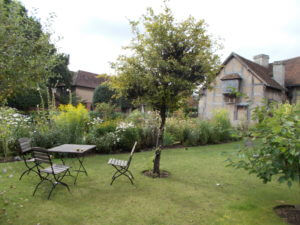
His father, John Shakespeare, was a glove-maker and made all kinds of gloves in his workshop on the ground floor. The window, now facing the shops on the high street, was where he sold all his gloves. It was a trading location at the time, and it still is!
Back in the Tudor era, you had to have a licence for all trading sectors, such as selling food or clothes. John had a licence for glove making.
To find out more about the Tudor era, click here .
His education
Because John Shakespeare was the Earl of Stratford (which is equivalent to the Mayor of Stratford) he got William a place in the local grammar school for free. If Shakespeare had gone to a different school, we may not know him as the famous playwright today…
From the age of 6 or 7, for 6 days of the week, at 6am he went to the local grammar school, which is still there today.
He left at the age of 14. He didn’t go to university because he was going to pay off his father’s debts. His works may not have been the same if he went to university. Who knows?
His inspiration for his plays
We don’t know where he got his inspiration from, but we do know that it would have been from the time he spent helping his father pay off debts.
Here comes the bride!
In 1582, when he was 18 years old, he married 26-year-old Anne Hathaway. She was already three months pregnant with her first child by the time Shakespeare married her.
They both had three children and had them baptised. The children being baptised was the last record of Shakespeare for seven years. By this time, Shakespeare had gone down to London to get a job. He was, at first, an actor. The next time he was recorded was when he had written his first play.
Let’s write some plays!
In 1589-1590, Shakespeare wrote Henry VI Part One on this year. A year later, he wrote Henry VI Part Two and another year later, Henry VI Part 3 . But it wasn’t until 1598 when he was actually credited for writing the plays.
Building the Globe
By 1599, Shakespeare was both famous and very rich thanks to the writing of his plays. By this point, Shakespeare was one of the people who owned Lord Chamberlain’s Men.
3 thoughts on “ William Shakespeare ”
What do you think about this?
Good evening. Thanks for this info! Love your blog!
Great information
Comments are closed.

- DIGITAL MAGAZINE
MOST POPULAR
15 top William Shakespeare facts!
Learn all about william shakespeare, the world-famous playwright and poet….
Please take your seats, the show is about to commence! All settled? Then let’s discover the life of the ‘greatest ever playwright’ in our fascinating Shakespeare facts…
William Shakespeare facts
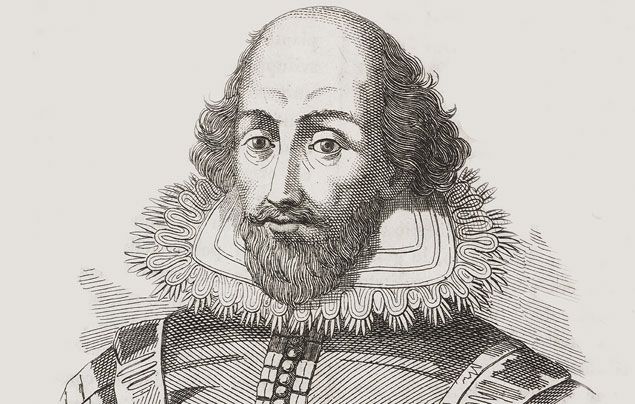
Full name: William Shakespeare. Born: Exact date unknown, but baptised 26 April 1564. Hometown: Stratford-upon-Avon, England. Occupation: Playwright, actor and poet. Died: 23 April 1616. Best known for: Writing hugely successful theatre plays! Also known as: The Bard of Avon.
1) During his lifetime, William Shakespeare wrote around 37 plays for the theatre and over 150 poems ! No one can say the exact number, because some of his work may have been lost over time – and some may have been written with the help of other people.
2) William was born in Stratford-upon-Avon in 1564, during England’s Tudor period . He was one of eight children born to John Shakespeare , a well-to-do glove-maker and leather worker, and his wife, Mary Arden , an heiress from a wealthy family.
3) Very little is known about William Shakespeare’s early years. In fact, his actual date of birth remains a mystery to this day! But it’s believed he had a good upbringing, attended a good school and enjoyed playing outdoors a lot.
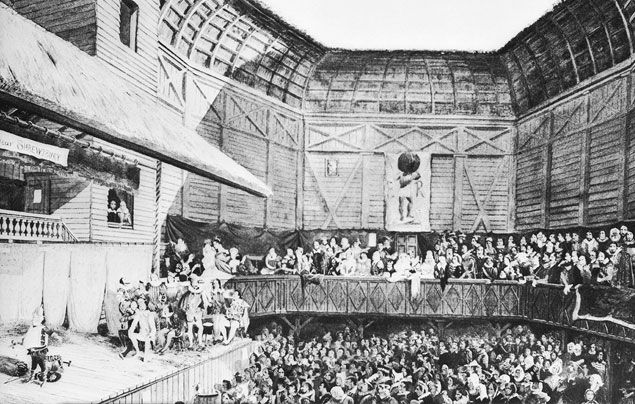
Did you know that we have a FREE downloadable William Shakespeare primary resource ? Great for teachers, homeschoolers and parents alike!
4) In 1582, William married a farmer’s daughter called Anne Hathaway . They had three children together – a daughter called Susanna , and twins, Judith and Hamnet .
5) Come 1585, the mysterious William Shakespeare disappeared from records for around seven years! Historians often refer to this part of the writer’s life as ‘ the lost years ‘ …
6) Then, in 1592 he suddenly turned up in London as an actor and playwright. But poor William didn’t have it easy – his jealous rivals, known as the ‘ University Wits ’, criticised and made fun of his work. One writer, named Robert Greene , referred to him as ‘an upstart crow’!
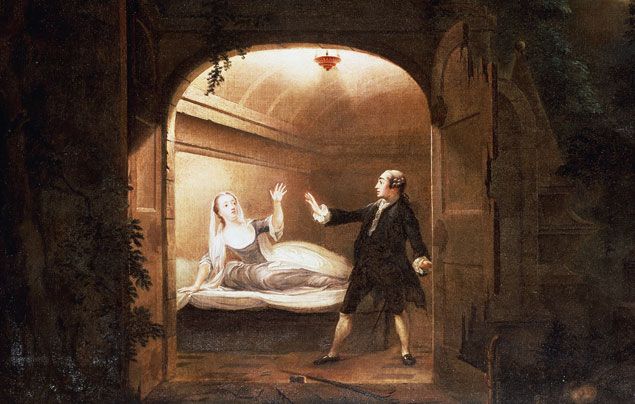
7) William was part of a theatre company called Lord Chamberlain’s Men , who regularly performed at a place called ‘ The Theatre ’. But after a dispute with the landlord, they took the building apart, rebuilt it across the river and named it the Globe .
8) A large, open-air theatre, the Globe accommodated for people from all walks of life, meaning that anyone could watch a performance there. If you were poor, you could only afford tickets to the ground floor where there were no seats and you were exposed to the cold, wind and rain that came in through the open top. If you were rich, you could afford to sit in the higher-level, covered galleries in a comfy seat – away from the smelly poor people below!
9) Shakespeare’s plays were immediately big hits! He wrote different kinds of plays, all of which could be divided into three categories:
Tragedy – including Hamlet , Othello , King Lear and Romeo and Juliet Comedy – including Twelfth Night and the The Taming of the Shrew History – including Henry IV , Henry V and Richard III
His plays made him very rich and famous. So much so, that by 1598, William owned houses in London and Stratford-up-Avon.
10) Shakespeare’s plays had the royal seal of approval. Both Queen Elizabeth I and James VI of Scotland and I of England would often hire Shakespeare’s company to come and perform at the royal court.
11) Plays in Shakespeare’s time were different to the ones we have today. There were no female actors (women’s parts were played by men!), and audiences could be very rowdy. They would shout, boo and even throw food at the actors they didn’t like!
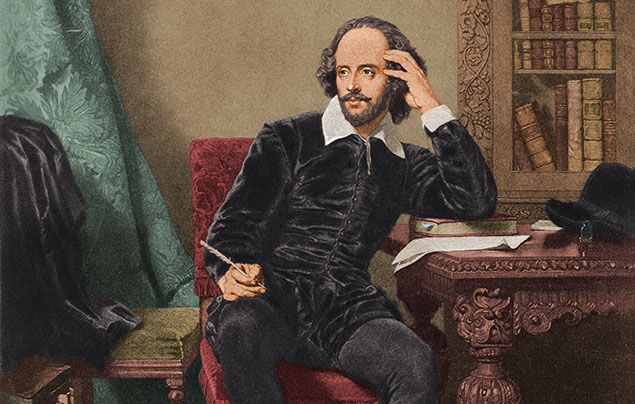
12) Plays at the Globe featured lots of exciting special effects , with trap doors, actors lifted on wires, smoke, fire and even cannons! Disaster struck in 1613 when a cannon shot set fire to the roof of the Globe and burned it down! It wasn’t long after that Shakespeare retired from the theatre.
13) Towards the end of his life, William lived quietly back in his hometown of Stratford-upon-Avon. He died on 23 April 1616 , aged 52, after falling ill. It’s believed he may have died on his birthday, but without an official birth record, no one can be sure!
14) Written on Shakespeare’s gravestone in Holy Trinity Church, Stratford-upon-Avon, is a curse written by the famous wordsmith himself. It reads:
‘Good friend for Jesus’ sake forbear, To dig the dust enclosed here. Blessed be the man that spares these stones, And cursed be he that moves my bones.’
15) Today, Shakespeare’s work is studied in schools and universities around the world, and his stories are depicted on TV and in films. In 1997, the modern Globe Theatre was opened in London. A reconstruction of the original, it’s just a few hundred metres from where the original one once stood. People can go to watch plays – just like in Shakespeare’s day!
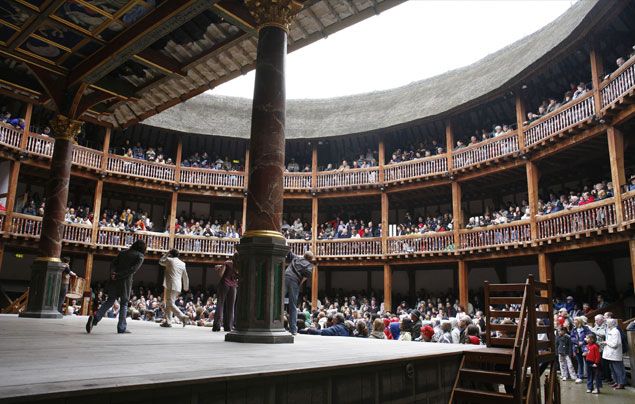
Did you know…? Many scholars wonder if Shakespeare actually wrote his plays! He made no mention of his career in his will – and he showed great knowledge of other countries in his plays, despite never leaving England. What’s most likely, however, is that Shakespeare pinched his references from classic old plays, just like everyone else did!
What did you think of our top Shakespeare facts? Leave a comment below and let us know!
Leave a comment.
Your comment will be checked and approved shortly.
WELL DONE, YOUR COMMENT HAS BEEN ADDED!
amazing information
Thank you! Great facts for my homework!☺️
That's alot of great information
lots of info
thank u so much for this! It helped me so much with my school project!
Thanks you! This helped me so much! I learned so many interesting facts that I did not know before!
thank u for this info!
this is so cool!!
it helped me a lot for my writing essay about Shakespeare!
this helped me in my biography a lot
Interesting
i like turtles
Very interesting.
This really helped with my homework!
thanks this was helpfull
I LOVE SHAKESPEARE POEM
good info v helpful
this was really usefull
hi everyone have a good day xo
this helped a lot!
So interesting
How old is shakespeare is he when he was alive
how did shakespeare come up with over 1700 words
interesting
thank you so much! helped with my homework a lot :)
I like aacting
Excellent facts
Nice! Very interesting, I learned alot.
[…] April is the month for celebrating Easter, ANZAC Day and the birth… and death of famous English playwright and poet, William Shakespeare. […]
Wow I didn't know that its so amazing thx for teaching me
[…] https://www.natgeokids.com/uk/discover/history/general-history/shakespeare-facts/ […]
CUSTOMIZE YOUR AVATAR
More like general history.

APRIL FOOLS’ PRANKS
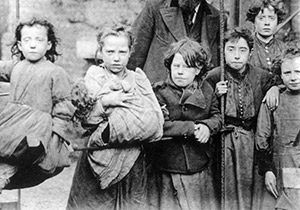
15 facts about the Victorians!
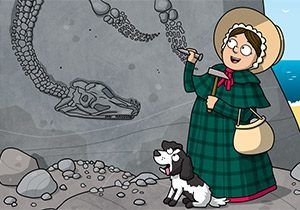
Mary Anning facts
Satellite images hint at lost mayan city.

Sign up to our newsletter
Get uplifting news, exclusive offers, inspiring stories and activities to help you and your family explore and learn delivered straight to your inbox.
You will receive our UK newsletter. Change region
WHERE DO YOU LIVE?
COUNTRY * Australia Ireland New Zealand United Kingdom Other
By entering your email address you agree to our Terms of Use and Privacy Policy and will receive emails from us about news, offers, activities and partner offers.
You're all signed up! Back to subscription site
Type whatever you want to search
More Results

You’re leaving natgeokids.com to visit another website!
Ask a parent or guardian to check it out first and remember to stay safe online.

You're leaving our kids' pages to visit a page for grown-ups!
Be sure to check if your parent or guardian is okay with this first.
- International
- Education Jobs
- Schools directory
- Resources Education Jobs Schools directory News Search
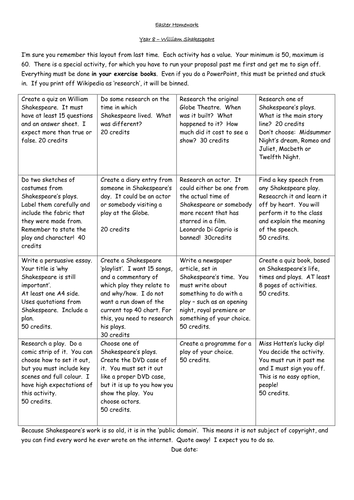
Shakespeare homework Project
Subject: Plays
Age range: 11-14
Resource type: Worksheet/Activity
Last updated
22 February 2018
- Share through email
- Share through twitter
- Share through linkedin
- Share through facebook
- Share through pinterest

This is an extended piece of homework that I set for my year 8s. It gives them the choice. I have found this format works quite well.
Tes classic free licence
Your rating is required to reflect your happiness.
It's good to leave some feedback.
Something went wrong, please try again later.
Amazing - thank you so much!
Empty reply does not make any sense for the end user
EnglishTeacherCornell
Fantastic resource with lots of helpful ideas.
Great stuff. Adapted for a Y6 topic homework.
Report this resource to let us know if it violates our terms and conditions. Our customer service team will review your report and will be in touch.
Not quite what you were looking for? Search by keyword to find the right resource:

IMAGES
VIDEO
COMMENTS
William Shakespeare is often praised as the world's greatest playwright . Though he lived 400 years ago, his plays are still studied and enjoyed today.
Top 10 facts. William Shakespeare was born in Stratford-upon-Avon in April 1564. Shakespeare's wife's name was Anne Hathaway. Shakespeare had three children: Susanna, Hamnet and Judith. Shakespeare worked as actor with the Lord Chamberlain's Men, later called the King's Men. Shakespeare wrote 154 sonnets and around 40 plays.
Studying Shakespeare is easy with CliffsNotes. Read the summaries of Shakespeare's plays such as Henry V, Romeo and Juliet, Hamlet, A Midsummer Night's Dream and many more! Ace your tests, get homework help, and understand Shakespeare's plays and poetry with FREE CliffsNotes summaries, character analyses, glossaries, quotes, essays, filmography, and more.
William Shakespeare was born in Stratford-upon-Avon, England, in 1564. This was the sixth year of the reign of Queen Elizabeth I. Shakespeare was christened on April 26 of that year. The day of his birth is unknown. It has long been celebrated on April 23, the feast day of St. George.
William Shakespeare- Term 2 Homework Booklet ... Shakespeare is the first person to use the following common phrases. In your own words, ... Your child's homework for English is to complete this booklet, to the best of their ability, and to read as much as they can and as often as they can. They should always have a book from the school ...
Multiple choice questions check comprehension as students read. Written responses allow students to respond to interpretive questions with their own takeaways. Students can highlight and annotate to engage with the text and respond to assignments. Students can easily save, export, and share their Notebook contents with their teacher.
Explore insightful questions and answers on William Shakespeare at eNotes. Enhance your understanding today! ... Homework Help ; Teacher Resources ; Start ...
Few authors can match William Shakespeare for broad appeal and sheer endurance. For more than four centuries he has entertained readers and theatergoers, helping us see our commonalities and revealing our humanness. Shakespeare's tender scenes of reconciliation, such as that between Lear and Cordelia, continue to break hearts in the 21st century.
Use Teach Shakespeare to find, use and save hundreds of teaching resources designed to make lesson planning easy and innovative.. You can access these dynamic and relevant resources from anywhere, to help build your schemes of work for 11-18 year olds. Search the free database by play, resource type, or teaching level.
Designed to help young learners understand the meaning of the plays, Shakespeare's works like 'Hamlet' and 'Twelfth Night' won't be Greek to them. Shakespeare activities for KS2, like these Macbeth Story Sequencing Cards, help your pupils remember what happens in the plays.
There are millions of pages that reference Shakespeare on the Internet. This site aims to make it a little easier to find the most useful ones. The e-mail policy of the Shakespeare Resource Center is simple: the SRC will not provide answers to questions about homework, paper topics, interpretations, etc. The purpose of this site is to provide ...
1 min. Updated: 31st January 2023. This William Shakespeare Hotspots activity is a fun and interactive way to learn important facts about the great poet and playwright. Use this Fact File to brush up on your knowledge of the Bard. Try working through this Shakespeare reading comprehension activity . This worksheet is a great way to understand ...
William Shakespeare Homework Help for Kids What fun and creative projects about William Shakespeare can I do with my child? Create a storyboard of the main events from one of Shakespeare's stories. Imagine you are going to make your own film version of Romeo and Juliet. Which famous people would you use for the main characters in the story?
pub, 187.5 KB. An A5 sized booklet for easy use with planners with three homework tasks based on Shakespeare. Tasks are project-based and include research, creative making and written tasks. Booklet also contains key words for a Shakespeare unit and space for learners to record any new vocabulary they learn. Creative Commons "Sharealike".
William Shakespeare (c. 23 April 1564 - 23 April 1616) was an English playwright, poet and actor.He is widely regarded as the greatest writer in the English language and the world's pre-eminent dramatist. He is often called England's national poet and the "Bard of Avon" (or simply "the Bard").His extant works, including collaborations, consist of some 39 plays, 154 sonnets, three long ...
You'll also get access to more than 30,000 additional guides and more than 350,000 Homework Help questions answered by our experts. ... William Shakespeare's family lineage came to an end two ...
William Shakespeare was born on the 23rd April 1564 in Stratford Upon Avon. His childhood home is still there today- and is now open for everyone to see. ... Homework Help For Kids is a website that provides information to help you with your piles of homework. We've been doing this since 2013, with this website and an app created in 2016.
1) During his lifetime, William Shakespeare wrote around 37 plays for the theatre and over 150 poems! No one can say the exact number, because some of his work may have been lost over time - and some may have been written with the help of other people. 2) William was born in Stratford-upon-Avon in 1564, during England's Tudor period.
William Shakespeare Quiz for Kids. 3 min. Updated: 31st January 2023. Work through these William Shakespeare quiz questions to see how much you know about the famous playwright and poet! What is William Shakespeare's nickname? Why were female roles in Shakespeare's plays performed by boys or young men?
Explore LearningMedia Resources by Subject. Twelfth Night by William Shakespeare as performed at Penn State, including lesson plans to teach each Act.
Shakespeare homework Project. Subject: Plays. Age range: 11-14. Resource type: Worksheet/Activity. File previews. docx, 15.94 KB. This is an extended piece of homework that I set for my year 8s. It gives them the choice. I have found this format works quite well.
President Joe Biden's homework assignment would challenge the most gifted politician: calm the country after Saturday's assassination attempt on former President Donald Trump, show empathy for his wounded political rival, and yet, at the same time, continue making the case that the Republican is unfit to be president again.
Top 10 William Shakespeare Facts for Kids. Some of his plays were written for the King and included references to his personal interests, such as magic and witches. Female roles were played by boys or young men. It wasn't until the Restoration period, later in the 17th Century, that women were allowed to perform on stage.
William Shakespeare Fact File. Here are even more amazing facts about William Shakespeare and his work: 1. Shakespeare's plays have been translated into every major language; that's over 100 languages! 2. The longest play William Shakespeare wrote is Hamlet. It has over 4,000 lines and the actor who plays Hamlet will have to learn to ...